https://sites.hks.harvard.edu/fs/pnorris/Acrobat/Brazil%20Electoral%20Reform.pdf
#THE CHALLENGE OF BRAZILIAN POLITICAL REFORM: THE IMPORTANCE OF VALUES
O
Desafio da Reforma Política Brasileira: A importâcia dos Valores
SOURCE
/ LINK: https://www.youtube.com/watch?v=v2N1uCDR3Eg
SOURCE
/ LINK:
http://www.institutomillenium.org.br/milleniumtv/a-importancia-dos-valores-n-politica/
The importance of
values
Luiz Felipe d'Avila
Millenium TV
05/05/2017
Political scientist Luiz
Felipe d'Ávila, a specialist at the Millennium Institute, speaks at
the "Statistical Forum" about the importance of discussing
values to implement policy changes. The event was organized by
the newspaper "O Estado de S. Paulo", the Movement Comes to
Rua and Irice (Institute of International Relations and Foreign
Trade), in the headquarters of the Federation of Commerce of Goods,
Services and Tourism of the State of São Paulo (Fecomercio-SP) and
supported by Imil.
Luiz Felipe Davila Political Reform
Luiz Felipe Davila Political Reform
Luiz Felipe d'Avila
Luiz Felipe d'Avila is founder and president of the CLP - Public Leadership Center, a non-profit organization dedicated to the formation of public leaders engaged in promoting transformative changes in Brazilian politics. Before creating the CLP, Luiz Felipe founded Editora D'Avila, a company that created magazines like República, a political title, and BRAVO !, the main magazine of art and culture in Brazil. In 2002, BRAVO! Was sold to Editora Abril, the largest magazine publisher in Latin America, where Luiz Felipe became Superintendent Director. Luiz Felipe is a member of the Board of LASPAU (affiliated with Harvard University), the Fernando Henrique Cardoso Foundation, the Millenium Institute and the Superior Electoral Court. He is also the author of several books on history and politics, such as Dona Veridiana, Virtuosos and Character and Leadership. He holds a degree in political science from the American University in Paris and a master's degree in public administration from the Harvard Kennedy School.
==//==
SOURCE/LINK:
https://www.youtube.com/watch?v=v2N1uCDR3Eg
SOURCE/LINK:
http://www.institutomillenium.org.br/milleniumtv/a-importancia-dos-valores-na-politica/
A importância dos valores
O
cientista político Luiz
Felipe d’Ávila, especialista do Instituto Millenium, fala no
“Fórum Estadão” sobre a importância da discussão de valores
para implementar mudanças na política. O evento foi organizado
pelo jornal “O Estado de S. Paulo”, o Movimento Vem pra Rua e o
Irice (Instituto de Relações Internacionais e Comércio Exterior),
na sede da Federação do Comércio de Bens, Serviços e Turismo do
Estado de São Paulo (Fecomercio-SP) e apoiado pelo Imil.
Luiz Felipe d’Avila
Luiz
Felipe d’Avila é fundador e presidente do CLP - Centro de
Liderança Pública, uma organização sem fins lucrativos dedicada
à formação de lideranças públicas engajadas em promover
mudanças transformadoras na política brasileira. Antes de criar o
CLP, Luiz Felipe fundou a Editora D’Avila, empresa que criou
revistas como República, um título de política, e BRAVO!, a
principal revista de arte e cultura do Brasil. Em 2002, a revista
BRAVO! foi vendida para a Editora Abril, a maior editora de revistas
da America Latina, onde Luiz Felipe tornou-se Diretor
Superintendente. Luiz Felipe é membro do Conselho da LASPAU
(filiada a Universidade de Harvard), Fundação Fernando Henrique
Cardoso, Instituto Millenium e do Tribunal Superior Eleitoral. É
também autor de vários livros de história e política, como Dona
Veridiana, Os Virtuosos e Caráter e Liderança. É formado em
ciências políticas pela Universidade Americana em Paris e tem
mestrado em administração pública pela Harvard Kennedy School.
RELACIONADOS
25/07/2017
Reforma política
Márcio Coimbra: "O sistema
brasileiro atual mostrou-se ineficaz no sentido de dar voz ao desejo
do ...
24/07/2017
Luiz Felipe d’Avila: “No Brasil,...
No 7º episódio da websérie “10
mandamentos para o Brasil que queremos”, o cientista político...
24/07/2017
Fundo eleitoral pode superar orçamento de 16...
Se a versão atual do texto da reforma
política for aprovada pela Câmara, os partidos terão um or...
21/07/2017
Em busca do voto distrital misto
Murillo de Aragão: "Voto
distrital misto favoreceria o federalismo e levaria política para a
popul...
==//==
Bello
Atualizando
a classe política do Brasil
Um congresso envolvido em escandalosos deve se reformar
Um congresso envolvido em escandalosos deve se reformar
Bello Upgrading Brazil’s political class
A
scandal-ridden congress must reform itself
Edição impressa | As Americas
30 de março de 2017
Print edition | The Americas
Mar
30th 2017
“DECENCY
now!” That slogan, on a banner at a demonstration in São Paulo on
March 26th, sums up what Brazilians want from their politicians. They
have come to expect the opposite. Rodrigo Janot, the chief
prosecutor, has asked the supreme court to open 83 investigations
into politicians whom he suspects of taking part in a scheme to
extract billions of dollars in bribes from construction firms, which
in turn benefited from inflated public contracts. Eight ministers in
the cabinet of President Michel Temer, the Speakers of both houses of
congress and grandees from all the main parties are reportedly on the
list. (All deny wrongdoing.) That adds to the dozens of officials
already caught up in the Lava Jato (“Car Wash”) investigations
into the scandal, which is centred on Petrobras, the state-controlled
oil company.
Revelations
of misdeeds by politicians have turned Brazilians’ attention to the
question of how to elect better ones. Today’s system encourages
political diversity at the expense of quality. Any new party that
secures 486,000 signatures (from a pool of 143m voters) has a right
to money from the state and to free television time. There is no
nationwide vote threshold for electing a party to congress.
Lower-house deputies, like senators, represent whole states rather
than districts, which makes campaigns expensive, encourages
corruption and weakens bonds between voters and their
representatives.![]()
PUBLICIDADE
Latest updates
GULLIVER10
HOURS AGO
GRAPHIC
DETAIL16
HOURS AGO
The
drafters of Brazil’s constitution set up the hyper-proportional
system in 1988 to ensure that all voices in the continent-sized
country would be heard. It has led to cacophony. One study of
legislatures in 137 countries elected from 1919 to 2015 found that
the lower house of Brazil’s current congress is the most fragmented
anywhere over that period. Most of its 28 parties have no ideology or
detailed programme. Nearly half of Brazilian voters forget which
candidate they picked barely a month after casting their ballots.
Presidents
dare not lose track. They must master unruly coalitions. Governments
buy politicians’ votes with favours. The Petrobras bribery scheme
was in part a way to reward congressmen for staying loyal to the
government of President Dilma Rousseff, who was impeached on an
unrelated charge last year.
This
model is now “exhausted”, says the top judge on the electoral
tribunal. In fact, its flaws were apparent from the beginning. Every
congress since 1988 has set up a commission to look into electoral
reform. They have not made much progress. In 1995 congress set a
threshold for parties to enter the legislature of 5% of the national
vote. The supreme court struck that down, saying it violated the
constitution’s goal of proportional representation.
Most
electoral innovations have come from the judiciary. In 2007 the
electoral tribunal ruled that congressmen who switch parties must
give up their seats. In 2015 the supreme court banned donations to
parties by corporations. The Lava Jato inquiries are themselves a
sort of political reform, “without anaesthesia”, as one minister
in Mr Temer’s government puts it. Dozens of lawmakers could be
charged before the election due in late 2018.
The
courts cannot do it all; politicians will have to reform themselves.
They are starting to do so. One step forward was a vote by the senate
in November to approve a constitutional amendment that would
establish a national vote threshold and prohibit electoral
coalitions. These are short-lived arrangements in which big parties
yield seats to smaller ones in exchange for their rights to
television time. If the lower house approves the amendment by October
this year, the next elections could be held under the new rules. The
next congress—less fragmented and more honest—could then make
further changes, including splitting up state-sized constituencies
into districts.
But
some fear that politicians will use reform to shield themselves from
greater accountability. One contentious proposal is to give voters a
choice among party lists rather than individual candidates. In 2015
the lower house defeated a plan to introduce such “closed lists”
by a vote of 402 to 21. Backbenchers feared it would let party chiefs
promote their cronies. The idea has come back. Proponents say that
closed lists would bolster parties and save them money, compensating
for the ban on corporate donations. That would be a plus.
But
to some voters, this looks like a plot to avoid the pain inflicted by
Lava Jato. Politicians in Mr Janot’s sights could be re-elected if
they hide behind party logos. “No to closed lists!” was among the
slogans seen at the protests in March. It is good news that the
arcane issue of political reform has moved on to the streets. That
means it may actually happen.
You’ve
seen the news, now discover the story
Get
incisive analysis on the issues that matter. Whether you read each
issue cover to cover, listen to the audio edition, or scan the
headlines on your phone, time withThe Economist is always
well spent.
==//==
Bello Atualizando a
classe política do Brasil
Um congresso escandaloso deve se reformar
Edição impressa | As Americas
30 de março de 2017
"DECÊNCIA agora!" Esse slogan, em uma pancada em uma manifestação em São Paulo em 26 de março, resume o que os brasileiros querem de seus políticos. Eles esperaram o contrário. Rodrigo Janot, procurador-chefe, pediu ao tribunal supremo que procedesse a 83 investigações sobre políticos que ele suspeitava participar de um esquema para extrair bilhões de dólares em subornos de empresas de construção, que, por sua vez, se beneficiaram de contratos públicos inflacionados. Oito ministros no gabinete do presidente Michel Temer, os palestrantes de ambas as casas de congressos e grandes de todas as partes principais estão na lista. (Todos negam os delitos.) Isso aumenta as dezenas de funcionários já envolvidos nas investigações do Lava Jato ("Car Wash") no escândalo, que é centrado na Petrobras, a companhia de petróleo controlada pelo estado.
Revelações de crimes por políticos tornaram a atenção dos brasileiros para a questão de como eleger melhores. O sistema de hoje incentiva a diversidade política em detrimento da qualidade. Qualquer novo partido que assegure 486 mil assinaturas (de um grupo de 143 milhões de eleitores) tem direito ao dinheiro do estado e ao tempo de televisão grátis. Não há um limite de voto nacional para eleger uma festa para o congresso. Os deputados da câmara , como os senadores, representam estados inteiros em vez de distritos, o que torna as campanhas caras, incentiva a corrupção e enfraquece os laços entre eleitores e seus representantes.
Os redactores da constituição do Brasil estabeleceram o sistema hiper-proporcional em 1988 para garantir que todas as vozes no país do tamanho do continente fossem ouvidas. Isso levou à cacofonia. Um estudo de legislaturas em 137 países eleitos entre 1919 e 2015 descobriu que a câmara baixa do atual congresso do Brasil é a mais fragmentada em qualquer lugar durante esse período. A maioria dos seus 28 partidos não tem ideologia ou programa detalhado. Quase metade dos eleitores brasileiros esquecem o candidato que escolheu apenas um mês depois de votar.
Os presidentes não se atrevem a perder a pista. Eles devem dominar as coalizões rebeldes. Os governos compram votos dos políticos com favores. O esquema de suborno da Petrobras foi, em parte, uma forma de recompensar os congressistas por permanecerem leais ao governo da presidente Dilma Rousseff, que foi acusada de um encargo não relacionado no ano passado.
Este modelo está agora "exausto", diz o principal juiz do tribunal eleitoral. Na verdade, suas falhas eram evidentes desde o início. Todo congresso desde 1988 criou uma comissão para examinar a reforma eleitoral. Eles não fizeram muito progresso. Em 1995, o congresso estabeleceu um limiar para que as partes entrem na legislatura de 5% do voto nacional. O tribunal supremo criticou isso, dizendo que violava o objetivo da representação proporcional da constituição.
A maioria das inovações eleitorais vem do judiciário. Em 2007, o tribunal eleitoral determinou que os congressistas que mudam de partido devem desistir de seus assentos. Em 2015, a Suprema Corte proibiu doações às partes por corporações. As consultas da Lava Jato são elas mesmas uma espécie de reforma política, "sem anestesia", como diz um ministro do governo de Temer. Dezenas de legisladores poderiam ser cobrados antes das eleições devido no final de 2018.
Os tribunais não podem fazer tudo; Os políticos terão que se reformar. Eles estão começando a fazê-lo. Um passo em frente foi uma votação do Senado, em novembro, para aprovar uma emenda constitucional que estabelecesse um limiar nacional de voto e proíba coligações eleitorais. Estes são acordos de curta duração em que as grandes partes produzem assentos para menores, em troca de seus direitos ao tempo de televisão. Se a câmara baixa aprovar a emenda até outubro deste ano, as próximas eleições poderão ser realizadas de acordo com as novas regras. O próximo congresso - menos fragmentado e mais honesto - poderia então fazer mais mudanças, incluindo dividir os grupos constitucionais do estado nos distritos.
Mas alguns temem que os políticos usem a reforma para proteger-se de uma maior responsabilidade. Uma proposta contenciosa é dar aos eleitores uma escolha entre listas de partidos e não candidatos individuais. Em 2015, a câmara baixa derrotou um plano para introduzir tais "listas fechadas" por um voto de 402 a 21. Os pensionistas temeram que os chefes do partido promovam seus amigos. A idéia voltou. Os defensores dizem que as listas fechadas reforçariam as partes e poupar-lhes dinheiro, compensando a proibição de doações corporativas.
Um congresso escandaloso deve se reformar
Edição impressa | As Americas
30 de março de 2017
"DECÊNCIA agora!" Esse slogan, em uma pancada em uma manifestação em São Paulo em 26 de março, resume o que os brasileiros querem de seus políticos. Eles esperaram o contrário. Rodrigo Janot, procurador-chefe, pediu ao tribunal supremo que procedesse a 83 investigações sobre políticos que ele suspeitava participar de um esquema para extrair bilhões de dólares em subornos de empresas de construção, que, por sua vez, se beneficiaram de contratos públicos inflacionados. Oito ministros no gabinete do presidente Michel Temer, os palestrantes de ambas as casas de congressos e grandes de todas as partes principais estão na lista. (Todos negam os delitos.) Isso aumenta as dezenas de funcionários já envolvidos nas investigações do Lava Jato ("Car Wash") no escândalo, que é centrado na Petrobras, a companhia de petróleo controlada pelo estado.
Revelações de crimes por políticos tornaram a atenção dos brasileiros para a questão de como eleger melhores. O sistema de hoje incentiva a diversidade política em detrimento da qualidade. Qualquer novo partido que assegure 486 mil assinaturas (de um grupo de 143 milhões de eleitores) tem direito ao dinheiro do estado e ao tempo de televisão grátis. Não há um limite de voto nacional para eleger uma festa para o congresso. Os deputados da câmara , como os senadores, representam estados inteiros em vez de distritos, o que torna as campanhas caras, incentiva a corrupção e enfraquece os laços entre eleitores e seus representantes.
Os redactores da constituição do Brasil estabeleceram o sistema hiper-proporcional em 1988 para garantir que todas as vozes no país do tamanho do continente fossem ouvidas. Isso levou à cacofonia. Um estudo de legislaturas em 137 países eleitos entre 1919 e 2015 descobriu que a câmara baixa do atual congresso do Brasil é a mais fragmentada em qualquer lugar durante esse período. A maioria dos seus 28 partidos não tem ideologia ou programa detalhado. Quase metade dos eleitores brasileiros esquecem o candidato que escolheu apenas um mês depois de votar.
Os presidentes não se atrevem a perder a pista. Eles devem dominar as coalizões rebeldes. Os governos compram votos dos políticos com favores. O esquema de suborno da Petrobras foi, em parte, uma forma de recompensar os congressistas por permanecerem leais ao governo da presidente Dilma Rousseff, que foi acusada de um encargo não relacionado no ano passado.
Este modelo está agora "exausto", diz o principal juiz do tribunal eleitoral. Na verdade, suas falhas eram evidentes desde o início. Todo congresso desde 1988 criou uma comissão para examinar a reforma eleitoral. Eles não fizeram muito progresso. Em 1995, o congresso estabeleceu um limiar para que as partes entrem na legislatura de 5% do voto nacional. O tribunal supremo criticou isso, dizendo que violava o objetivo da representação proporcional da constituição.
A maioria das inovações eleitorais vem do judiciário. Em 2007, o tribunal eleitoral determinou que os congressistas que mudam de partido devem desistir de seus assentos. Em 2015, a Suprema Corte proibiu doações às partes por corporações. As consultas da Lava Jato são elas mesmas uma espécie de reforma política, "sem anestesia", como diz um ministro do governo de Temer. Dezenas de legisladores poderiam ser cobrados antes das eleições devido no final de 2018.
Os tribunais não podem fazer tudo; Os políticos terão que se reformar. Eles estão começando a fazê-lo. Um passo em frente foi uma votação do Senado, em novembro, para aprovar uma emenda constitucional que estabelecesse um limiar nacional de voto e proíba coligações eleitorais. Estes são acordos de curta duração em que as grandes partes produzem assentos para menores, em troca de seus direitos ao tempo de televisão. Se a câmara baixa aprovar a emenda até outubro deste ano, as próximas eleições poderão ser realizadas de acordo com as novas regras. O próximo congresso - menos fragmentado e mais honesto - poderia então fazer mais mudanças, incluindo dividir os grupos constitucionais do estado nos distritos.
Mas alguns temem que os políticos usem a reforma para proteger-se de uma maior responsabilidade. Uma proposta contenciosa é dar aos eleitores uma escolha entre listas de partidos e não candidatos individuais. Em 2015, a câmara baixa derrotou um plano para introduzir tais "listas fechadas" por um voto de 402 a 21. Os pensionistas temeram que os chefes do partido promovam seus amigos. A idéia voltou. Os defensores dizem que as listas fechadas reforçariam as partes e poupar-lhes dinheiro, compensando a proibição de doações corporativas.
==//==
SOURCE/LINK:
http://www.idea.int/news-media/news/international-idea-contributes-brazils-political-and-electoral-reform-process
News
Home
/ News & Media /
News /
International IDEA contributes to Brazil's political and electoral
reform process
News Article
International IDEA contributes to Brazil's political and electoral reform process
By:
PUBLISHED:
30/03/2017
|
|
On the
20th and
21st
of March 2017, International IDEA’s Secretary-General Yves Leterme
and Daniel Zovatto, IDEA’s Director for Latin America and the
Caribbean, travelled to Brasilia, to participate in the seminar
“Models of
electoral systems - international contribution to the political
reform in Brazil”
organized by the Superior Electoral Court and the Chamber of
Deputies of Brazil, with support of International IDEA. The seminar
aimed at providing an overview of international good practices in
political and electoral reform as inputs for the Brazilian electoral
reform process.
During the
seminar, Secretary-General Yves Leterme gave a keynote speech that
provided an overview of the strengths and weaknesses of electoral
systems around the world. As former Prime Minister of Belgium, he
also shared his knowledge about the Belgian electoral system and its
potential lessons for Brazil. He also shared International
IDEA’s Electoral Systems Design Handbook, with the seminar's
participants.
Daniel
Zovatto, International IDEA´s Director for Latin America and the
Caribbean, moderated a panel of international experts on “District,
proportional or mixed vote”.
Over the
course of the two days, the Secretary-General held a series of
bilateral meetings with the President of the Republic of Brazil,
Michel Temer, the Presidents of the Brazilian Chamber of Deputies
and the Federal Senate, Rodrigo Maia and Eunício Oliveira
respectively and with the Ministry of Foreign Affairs, Aloysio Nunes
Ferreira, among other Brazilian political representatives.
Brazil
became a member state of International IDEA in April 2016 and the
seminar is a reflection of the strong partnership between Brazil and
International IDEA.
Related News & Media
Aug 212017
News Article
Aug 212017
News Article
Aug 092017
News Article
Aug 092017
News Article
Aug 092017
News Article
Aug 022017
News Article
First
year of parliamentary management in Peru: International IDEA supports
evaluation of the legislative work
Keep in Touch
International Institute for Democracy and Electoral Assistance (International IDEA)Strömsborg, SE-103 34
Stockholm, Sweden
Tel: +46 8 698 37 00
Fax: +46 8 20 24 22
-
Our Work
-
What We Do
-
Data & Tools
-
Tools
-
Publications
-
CC
Licence
-
News & Media
-
Newsletters
-
About Us
-
Partners
Newsletters
Stay informed of our latest news!
© 2017 International IDEA. All Rights Reserved | Terms
and Conditions | Privacy
Policy | Cookie Policy
| Sitemap
THE END


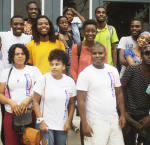
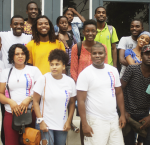
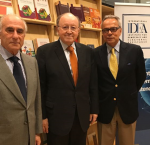
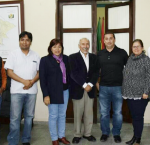
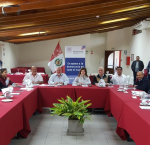
Nenhum comentário:
Postar um comentário